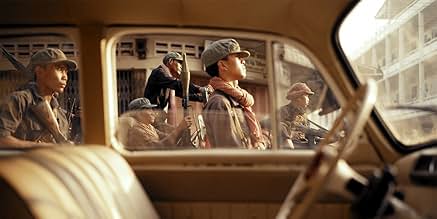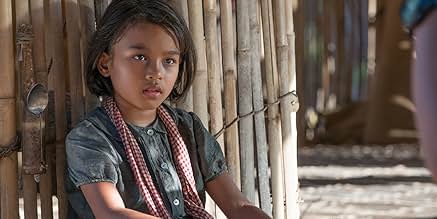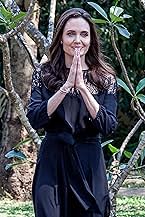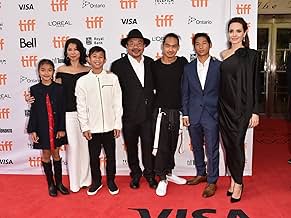L'auteure et militante cambodgienne des droits de l'homme Loung Ung raconte les horreurs qu'elle a subies lorsqu'elle était enfant sous le règne des Khmers rouges.L'auteure et militante cambodgienne des droits de l'homme Loung Ung raconte les horreurs qu'elle a subies lorsqu'elle était enfant sous le règne des Khmers rouges.L'auteure et militante cambodgienne des droits de l'homme Loung Ung raconte les horreurs qu'elle a subies lorsqu'elle était enfant sous le règne des Khmers rouges.
- Réalisation
- Scénario
- Casting principal
- Nomination aux 1 BAFTA Award
- 9 victoires et 29 nominations au total
- Self
- (images d'archives)
- Self
- (images d'archives)
Avis à la une
I did not expect that I would have been so emotional after watching this movie. And several times, I found myself revisiting both the troubling and precious moments portrayed in the film. Perhaps it's because my earliest memories of television are news film of war in Indochina, and the opening scenes briefly show Long Ung standing beside a black and white television, with similar vision playing while the Khmer Rouge are marching down the streets outside. I found myself trying to compare my childhood to hers. For me this alone is powerful. Don't expect any big history questions to be answered or seek to ask who's responsible, this isn't needed to see this story as it would have been seen through the eyes of a child.
Le saviez-vous
- AnecdotesAlmost all Cambodian artists, actors and film professionals were killed during the Khmer Rouge regime and only a few of the directors were able to flee the country. The history of the birth and destruction of Cambodian cinema is covered in the documentary Le Sommeil d'or (2011) from the first Cambodian film made in 1960 to the arrival of the Khmer Rouge in 1975. In these 15 years, about 400 films were produced, but only 30 films survived. With a few of the survivors telling their stories, the documentary tries to bring back to life the myths and legends of this lost cinema. Most of the old movie theaters of Phnom Penh have now become restaurants, karaoke places or squats.
- GaffesFrom 1975 to 1979, people had only skin cover their bone due to heavily overwork and starvation. Most of the scenes from movie show people still healthy with no lack of food or nutrient.
- Citations
[first lines]
Richard Nixon: [on broadcast TV] Cambodia, a small country of 7 million people, has been a neutral nation since the Geneva agreement of 1954. American policy since then has been to scrupulously respect the neutrality of the Cambodian people.
British Reporter: [standing with troops] The Vietnamese armies on the south side of the river appear to be indifferent to the contest.
Cambodian Politician: Under the pretext that there is a war necessity, they come into Cambodia.
Field Reporter: Are you glad to be in Cambodia?
Soldier: Negative. No.
Radio Reporter: The principle casualties appear to be innocent Cambodians.
Henry Kissinger: [at podium] ... the occasional difficulties in reaching a final solution.
Richard Nixon: What we are doing is to help the Cambodians help themselves. This is *not* an invasion of Cambodia.
French Reporter: The Nixon Doctrine for Southeast Asia appears to have failed. The war that began in Vietnam has now engulfed Cambodia. There is anger and frustration at the US bombings. Thousands of lives lost. Farms and livelihoods destroyed.
- ConnexionsFeatured in The 75th Annual Golden Globe Awards (2018)
Meilleurs choix
- How long is First They Killed My Father?Alimenté par Alexa
Détails
- Date de sortie
- Pays d’origine
- Site officiel
- Langues
- Aussi connu sous le nom de
- First They Killed My Father
- Lieux de tournage
- Sociétés de production
- Voir plus de crédits d'entreprise sur IMDbPro
Box-office
- Budget
- 24 000 000 $US (estimé)
- Durée
- 2h 16min(136 min)
- Couleur
- Mixage
- Rapport de forme
- 1.85 : 1
























